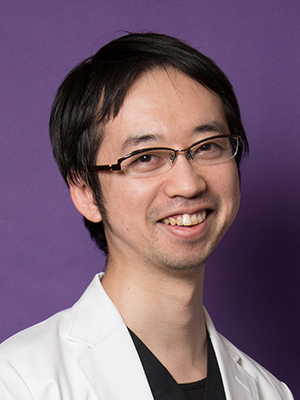Shintaro Akiyama, MD, PhD, will be completing his training at the University of Chicago Medicine under the mentorship of David T. Rubin, MD, thanks to the generous support of GIRF, further demonstrating their commitment to investing in the early career advancement of GI physicians and the future of digestive diseases research.
Akiyama, originally from Tokyo, Japan, is currently running an important study in pursuit of treatment options and a cure for Crohn’s disease and ulcerative colitis. For patients with severe ulcerative colitis, one treatment option is the surgical removal of the patient’s entire large intestine (or colon). For some of these patients, an organ called a J pouch is created from the small intestine to serve some of the same functions as the colon. However, not all J pouches work equally well, and the reasons why are largely unknown. Some patients are plagued by inflammation of the pouch (or “pouchitis”), which, just like inflammatory bowel disease, greatly impairs their quality of life. Akiyama’s work at the University of Chicago Medicine has focused on a large study of such patients, and he has examined the results of over 1000 endoscopic tests of J pouches in order to build a patient database to test hypotheses about variations in endoscopic phenotypes (i.e., the way the interior of J pouch varies in appearance, texture, etc.), demographics, and microscopic structural differences in patients with the J pouch. Through this research, Akiyama is developing a scoring system to predict J pouch outcomes, called the Chicago Score for Pouch Inflammation, the first tool of its kind.
Akiyama was also the lead author on a systematic review and meta-analysis of effective strategies to prevent chronic Clostridioides difficile (rCDI) infections in the Journal of Clinical Gastroenterology in February 2020. rCDI is an extremely common and pernicious intestinal infection, which has proven difficult to treat. Akiyama and colleagues reviewed the safety and efficacy of monoclonal antibodies toxins A (actoxumab) and B (bezlotoxumab), which have been used in combination and alone as treatments for rCDI. This meta-analysis concluded that treatment with bezlotoxumab is more effective than a placebo, and sufficiently safe to warrant its use in treating recurrent rCDI infections.
Akiyama’s work in Japan centered around the investigation of stem cell differentiation using intestinal organoids, or mini-guts, grown in the lab, a novel research development that allows for many heretofore impossible scientific investigations, including testing different medical therapies for effectiveness without a human or animal host, as well as examining the impact of interventions on the organoid’s microbiome. This biotechnology is currently used in the laboratories of Eugene Chang, MD; David T. Rubin, MD; and other University of Chicago faculty in pursuit of a cure for Crohn’s disease and ulcerative colitis.
David T. Rubin, MD, Lead Scientific Advisor of the GI Research Foundation and Dr. Akiyama’s mentor explains that Akiyama’s work directly feeds into the University of Chicago Medicine Digestive Diseases ten million dollar “moonshot” program, Finding the Cause of IBD. Rubin says, “These studies are using the inflammation of a J pouch as a human model of IBD, and using it for genetic and microbiome analyses. Appropriate recognition of the heterogeneity of pouchitis and classification is absolutely foundational to these investigations. We are all indebted to Dr. Akiyama’s diligent and impressive work.”
Akiyama’s mentor, Atsushi Sakuraba, MD, PhD, Assistant Professor at the University of Chicago Medicine, seconds this, saying, “Shintaro is a valuable member of our team, and we are very pleased with his work this past year. He has learned and contributed so much to our research, and I look forward to a productive collaboration not just next year, but in the years to come. Thank you to the GI Research Foundation for making this possible.”
Ever humble, Akiyama is grateful for GIRF’s support. “I have greatly enjoyed my time at the University of Chicago and am looking forward to continuing my research projects with everyone on the IBD team. I have learned so much from my mentors— thank you to GIRF for making this possible. I deeply appreciate my wife, Minako, as well, because I cannot do research without her support. I am very grateful for this wonderful opportunity.”

